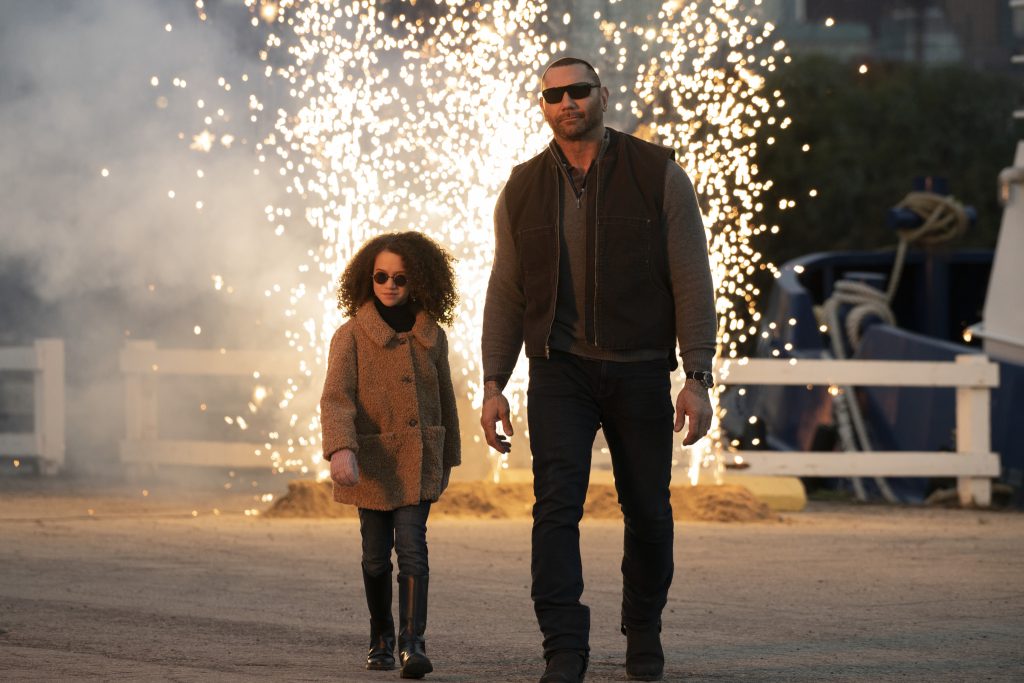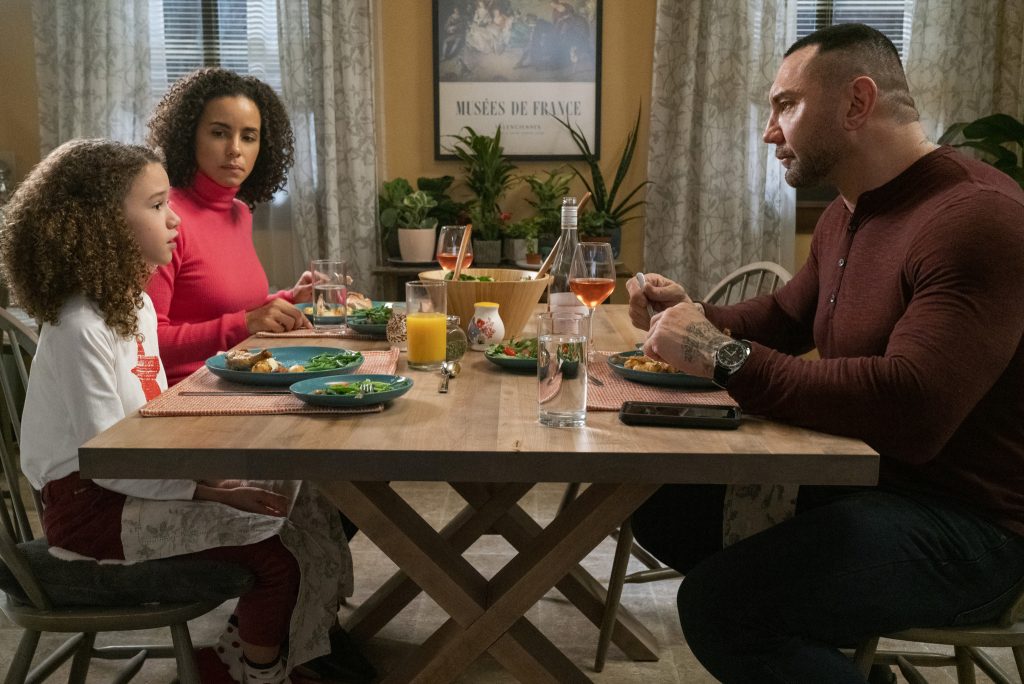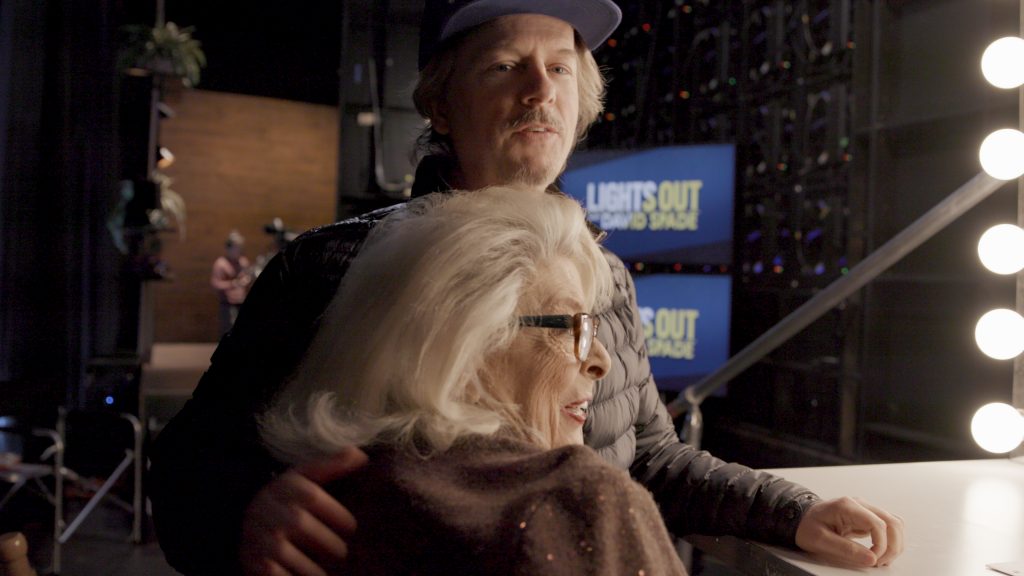August 27, 2020
by Carla Hay

Directed by Dean Parisot
Culture Representation: Taking place in various parts of Earth (particularly in the fictional San Dimas, California) and in outer space, the comedy film “Bill & Ted Face the Music” has a predominantly white cast of characters (with some African Americans and a few Asians) representing the middle-class.
Culture Clash: Two middle-aged men who used to be rock stars face several obstacles when they try one last time to find a song that will save the world.
Culture Audience: “Bill & Ted Face the Music” will appeal primarily to fans of star Keanu Reeves and the previous “Bill & Ted” movies, but most people will be disappointed by this incoherent, not-very-funny sequel.

After years of discussions, false starts and pre-production problems, the long-awaited comedy sequel “Bill & Ted Face the Music” has arrived—and it lands with the kind of clumsy thud that happens when the movie’s title characters use their time-traveling phone booth to crash-land in a different era. The movie is overstuffed with too many bad ideas that are sloppily executed. And the end result is an uninspired mess that brings few laughs.
The movie is the follow-up to 1989’s “Bill & Ted’s Excellent Adventure” and 1991’s inferior “Bill & Ted’s Bogus Journey.” “Bill & Ted Face the Music” is by far the worst of the three movies, which all star Keanu Reeves as Ted Theodore Logan and Alex Winter as Bill S. Preston. You’d think that with all the years that have passed between the second and third movies that it would be enough time to come up with a great concept for the third film. But no. “Bill & Ted Face the Music” writers Chris Matheson and Ed Solomon, who also wrote the first two “Bill & Ted” movies, have added several new characters and unnecessary subplots as a way to distract from the story’s very weak plot.
In “Bill & Ted’s Excellent Adventure,” the dimwitted duo Bill and Ted were high-school students in the fictional Sam Dimas, California, with dreams of making it big as a two-man rock band called Wyld Stallyns. Bill and Ted were on the verge of flunking out of school unless they got an A+ grade on their final history exam. Through a series of bizarre circumstances, they’re visited from another planet by someone named Rufus (played by George Carlin), who gave Bill and Ted a time-travel phone booth.
Bill and Ted used the time-traveling booth to collect real-life historical people (Napoleon, Billy the Kid, Ludwig van Beethoven, Genghis Khan, Abraham Lincoln, Sigmund Freud and Joan of Arc), in order to bring them back to San Dimas as part of Bill and Ted’s school presentation for their history exam. Two British princesses from another century named Elizabeth and Joanna ended up as Bill and Ted’s girlfriends and decided to stay in San Dimas with Bill and Ted.
In “Bill & Ted’s Bogus Journey,” Bill and Ted fought evil robot replicas of themselves that were sent from the future to alter Bill and Ted’s destiny of becoming rock stars who can save the world. Along the way, the real Bill and Ted also battled with Death (played by William Sadler) by playing a series of games. Bill married Joanna, Ted married Elizabeth, and each couple had a child born in the same year. And (this won’t be a spoiler if you see “Bill & Ted Face the Music”) Wyld Stallyns also became a superstar act.
In “Bill & Ted Face the Music,” it’s explained in the beginning of the film that Wyld Stallyns’ success was short-lived. In the subsequent years, Bill and Ted made many failed attempts at a comeback. They are now unemployed musicians who are trying not to be bitter over their lost fame and fortune. But their wives are starting to get fed up with Bill and Ted’s irresponsible lifestyle.
Joanna (played by Jayma Mays) and Elizabeth (played by Erinn Hayes) are the family breadwinners because Bill and Ted blew all their rock-star money and don’t have steady incomes. Bill and Joanna’s daughter Wilhelmina “Billie” S. Logan (played by Samara Weaving) and Ted and Elizabeth’s daughter Thea Theadora Preston (played by Brigette Lundy-Paine) are both 24 years old and take after their fathers, in that they are both unemployed and not very smart but they are passionate about music.
The movie’s poorly written screenplay assumes that many viewers have already seen the first “Bill & Ted” movies to understand some of the jokes. But even people who saw the first two movies might have seen the movies so long ago that these jokes won’t land very well anyway. Some of the jokes in “Bill & Ted Face the Music” have a little better context if you saw the first two “Bill & Ted” movies, but references to the first two movies make the most sense in the scenes with the wives of Bill and Ted.
In the beginning of “Bill & Ted Face the Music,” a wedding reception is taking place where Bill and Ted give a toast to the newlyweds and then inevitably give a terrible music performance. The newlyweds are Ted’s younger brother Deacon (played by Beck Bennett) and Missy (played by Amy Stoch, reprising her role from the first two “Bill & Ted” movies), who was married to Bill’s father in the first movie in a May-December romance. Missy is not that much older than Bill, and in the first “Bill & Ted” movie, there’s a running joke that Bill lusts after his stepmother Missy.
In “Bill & Ted Face the Music,” it’s mentioned in a voiceover that in the years since the second movie took place, Missy divorced Bill’s father (who is not seen in “Bill & Ted Face the Music”), and then married and divorced Ted’s policeman father (played by Hal Landon Jr., who reprises his role as Ted’s stern father), who is now chief of the local police. And now, Missy is married to Ted’s younger brother Deacon, who is also a cop. These awkward family dynamics could have been mined for hilarious situations and more jokes in the movie, but they fall by the wayside because the movie gets caught up in some messy subplots that get tangled up with each other.
Bill, Ted, Joanna and Elizabeth are in couples counseling with Dr. Taylor Wood (played by Jillian Bell), who is baffled over why both couples want to be in counseling sessions with her at the same time, as if it’s a double date. Bell is a terrific comedic actress, but the dull lines she’s given in “Bill & Ted Face the Music” are so listless and unimaginative, that her talent is wasted in this film. It’s eventually revealed that unless Bill and Ted change their destiny, their wives will leave them and their children will be estranged from Bill and Ted.
How do Bill and Ted find out that they can change their destiny? It’s because someone from outer space comes to San Dimas to tell them the world is ending and can only be saved if Bill and Ted find the song that will not only unite the world but also restore reality as they know it. The visitor from outer space is named Kelly (played by Kristen Schaal), who is sympathetic to Bill and Ted and wants to help them. She has arrived on Earth at the behest of her mother called the Great Leader (played by Holland Taylor), a jaded matriarch who doesn’t have much faith that Bill and Ted can deliver the song that can save the world.
Bill and Ted’s time-traveling phone booth is brought back from outer space (with a hologram of Rufus, using brief archival footage of the late Carlin), so Bill and Ted jump back and forth to different times and places in their quest to find the song. Dave Grohl (of Foo Fighters and Nirvana fame) has a cameo as himself in one of these scenes. Meanwhile, the “world is ending” scenes include historical figures ending up in the wrong places or people suddenly disappearing, as if to show that history and reality are being warped into an irreversible void.
The movie also spends a lot of screen time showing Bill and Ted encountering different versions of themselves in future and/or alternate realities. These scenarios include Bill and Ted as old men in a nursing home; Bill and Ted with bodybuilder physiques in prison; and Bill and Ted as successful rock stars with fake British accents. All of these scenes mostly serve the purpose to show Reeves and Winter acting silly in various hairstyles, costumes and prosthetic makeup. However, almost none of these scenes are genuinely funny
And if all of that weren’t enough to overstuff the movie, there’s a simultaneous storyline with Billie and Thea doing their own time traveling. While in San Dimas, space alien Kelly met the two daughters and explained the urgency of how Bill and Ted have to save the world. In order to help their fathers, Billie and Thea decide they want to create the ultimate band that can accompany the Wyld Stallyns when they play the song that will save the world. Kelly provides Billie and Thea with their own time-traveling spacecraft, and so off Thea and Billie go to recruit top musicians to join the band.
They end up recruiting Jimi Hendrix (played by DazMann Still, doing a barely passable impersonation) and Louis Armstrong (played by Jeremiah Craft, doing an awful, mugging impersonation), Wolfgang Amadeus Mozart (played by Daniel Dorr, doing an average impersonation), plus two fictional musicians: Chinese violinist Ling Lum (played by Sharon Gee) from 2600 B.C. and North African drummer Grom (played by Patty Anne Miller) from 11,500 B.C. And because apparently no A-list superstars rapper wanted to be in this train-wreck movie, Kid Cudi (playing himself) is also in this makeshift band.
Meanwhile, the Great Leader grows impatient with the bungling Bill and Ted, so she sends a robot named Dennis Caleb McCoy (played by Anthony Carrigan) to assassinate Bill and Ted. The robot keeps announcing that his name is Dennis Caleb McCoy and that’s supposed to be a joke—but it’s a joke that gets old by the second time it’s said. And it comes as no surprise that Death (with Sadler reprising the role) is in this “Bill & Ted” movie too, which recycles some plot elements of “Bill & Ted’s Bogus Journey.”
A huge part of the appeal of the first two “Bill & Ted” movies is that these characters were young and dumb. Their “party on, dude” attitude and antics were meant to be laughed at because it was a parody of how a lot of young people act when they have the freedom to be reckless. But now that Bill and Ted are middle-aged, their doltish mindset isn’t so funny anymore, which is why the filmmakers came up with the gimmick of having Bill and Ted’s children take up the mantle of being the “young and dumb” characters in this movie.
Lundy-Paine as Thea gives the better progeny performance, since she’s believable as Ted’s daughter. And even though her body language seems a bit forced and awkward at times, Lundy-Paine shows a knack for comedic timing. Unfortunately, Weaving is miscast as Bill’s daughter Billie, because Billie doesn’t look like she inherited any of the mannerisms that would make her recognizable as Bill’s daughter. In other words, her “dimwit” act is not credible at all. And it might be a compliment to say that Weaving is just too smart for this movie.
Reeves and Winter do exactly what you expect them to do: act like middle-aged versions of Bill and Ted. But the movie looks like it was thrown together haphazardly instead of being a great and original idea that writers Matheson and Solomon had the time to work on for all these years. You don’t have to see the first two “Bill & Ted” movies to understand what’s going on in “Bill & Ted Face the Music” because so much of the story is lazily written dreck that will confuse some people anyway. Seeing the first two “Bill & Ted” movies right before seeing “Bill & Ted Face the Music” might also underscore how much better the first two movies were.
And for a movie that’s supposed to center on music, “Bill & Ted Face the Music” has original songs that are utterly generic and forgettable. There used to be a time when a “Bill &Ted” soundtrack was sort of a big deal in the music business. Not anymore.
Just like the misguided “Dumb and Dumber” and “Zoolander” sequels that had the original comedic duo stars but came decades after the original movies, “Bill & Ted Face the Music” arrives too late and falls very short of expectations that weren’t very high anyway. Whereas the first “Bill & Ted” movie sparingly used the idea of Bill and Ted confronting their alternate-reality selves, “Bill & Ted Face the Music” over-uses this concept as filler for a shambolic, insipid plot that is the very definition of “throw everything against the wall and see what sticks.” “Bill & Ted Face the Music” is like the equivalent of loud, screeching feedback from an amped guitar that is grossly out of tune and ends up creating a lot of unnecessary and irritating noise.
Orion Pictures will release “Bill & Ted Face the Music” in U.S. cinemas and on VOD on August 28, 2020.




